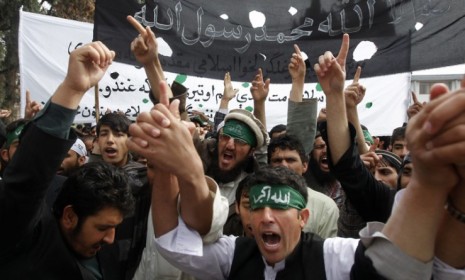America's crumbling relationship with Afghanistan: A timeline
The U.S. war effort has been seriously undermined by the murder of Afghan civilians, insensitive Koran burnings, and disparaging diplomatic cables

Sunday's alleged massacre of 16 Afghan villagers by a rogue U.S. Army sergeant is already having deadly repercussions: An Afghan soldier was killed Monday when Taliban militants opened fire on an Afghan government delegation visiting the area where the murders occurred. Sadly, this is just the latest in a series of unfortunate events that have undermined America's relationship with Afghanistan's government — and its people — ahead of the planned withdrawal of U.S. forces in 2014. Here, a concise recap of where things went wrong in the last few years:
September 2010
Protests break out in Afghanistan after a U.S. pastor, Terry Jones, announces that his Florida congregation would burn a Koran to mark the anniversary of the Sept. 11, 2001, terrorist attacks. Two people are killed and a half dozen injured when protests against Jones turn violent in Afghanistan. After facing relentless pounding in the media, Jones relents, calling off the event.
The Week
Escape your echo chamber. Get the facts behind the news, plus analysis from multiple perspectives.

Sign up for The Week's Free Newsletters
From our morning news briefing to a weekly Good News Newsletter, get the best of The Week delivered directly to your inbox.
From our morning news briefing to a weekly Good News Newsletter, get the best of The Week delivered directly to your inbox.
December 2010
Afghan officials react angrily to U.S. diplomatic cables posted online by WikiLeaks. In one cable, Ambassador Karl Eikenberry says Afghan Finance Minister Omar Zakhilwal, who is widely respected among foreign leaders, had called Afghan President Hamid Karzai "an extremely weak man." Zakhilwal adamantly denies the claim, charging that the cable is "extremely unprofessional" and "extremely undiplomatic." Zakhilwal warns that it has eroded trust between the Afghan government and the U.S. embassy.
March 2011
An investigation by Rolling Stone sheds fresh light on murders of Afghan civilians allegedly carried out by a "kill team" of U.S. soldiers. The 8,000-word article provides gory details of the charges against soldiers from the 5th Starker Brigade, 3rd Platoon, as well as actions allegedly taken by their superiors to cover up murderous violence. Four service members are ultimately convicted on charges connected to the deliberate killing of three Afghan civilians during patrols in 2010.
A free daily email with the biggest news stories of the day – and the best features from TheWeek.com
April 2010
Jones quietly goes through with his Koran burning. The event is largely ignored in the U.S. media, but Jones posts a video online that infuriates audiences in Afghanistan and other Muslim countries. Rioting breaks out in the Afghan city of Mazar-i-Sharif. Twenty-two people are killed, including seven United Nations workers and four guards. Jones insists that the deaths aren't his fault.
November 2011
One of the top U.S. commanders in Afghanistan, Major Gen. Peter Fuller, is relieved of his duties after disparaging Karzai. In an interview with Politico, Fuller says the Afghan leader is "isolated from reality," and that he and other members of his government have failed to appreciate the sacrifices that America has made to support them. Fuller is particularly critical of a statement by Karzai suggesting he would side with Pakistan if it went to war against the U.S. "You've got to be kidding me — I'm sorry, we just gave you $11.6 billion and now you're telling me, 'I don't really care?'"
January 2012
Video surfaces online showing a group of four uniformed U.S. Marine snipers urinating on the corpses of Taliban fighters. "Have a great day, buddy," one of the Marines says. U.S. Defense Secretary Leon Panetta calls the video "utterly deplorable" and launches an investigation. Afghan President Hamid Karzai says the scene is "completely inhuman."
February 2012
Riots break out after workers at a U.S.-run prison reveal that American soldiers put Korans and other religious materials in a pit and set them on fire. The Pentagon says the Muslim holy books were burned by mistake after being taken away from captured insurgents who were using them to pass messages to each other. The damage, however, is done. Several rioters are killed and two American officers working in the closely guarded Afghan Interior Ministry are murdered, shot at point-blank range, prompting the U.S. military to pull advisers out of Afghan ministries. Several Afghan lawmakers call for an immediate U.S. withdrawal.
March 2012
The U.S. faces a renewed backlash following the killing of 16 Afghan villagers, including women and children, in their homes while they slept. GOP presidential hopeful Newt Gingrich says the crisis is just the latest piece of evidence showing that the Western mission in Afghanistan is no longer "doable." Obama administration officials reportedly consider whether the reaction to the murders, which Karzai calls unforgivable, would make it wise to speed up the handover of security duties to Afghan forces, now set for 2014. But officially, the Pentagon says the timetable will remain unchanged.
Sources: Associated Press (2), Politico, Reuters
-
 Grok in the crosshairs as EU launches deepfake porn probe
Grok in the crosshairs as EU launches deepfake porn probeIN THE SPOTLIGHT The European Union has officially begun investigating Elon Musk’s proprietary AI, as regulators zero in on Grok’s porn problem and its impact continent-wide
-
 ‘But being a “hot” country does not make you a good country’
‘But being a “hot” country does not make you a good country’Instant Opinion Opinion, comment and editorials of the day
-
 Why have homicide rates reportedly plummeted in the last year?
Why have homicide rates reportedly plummeted in the last year?Today’s Big Question There could be more to the story than politics